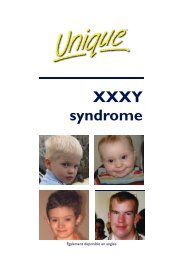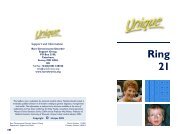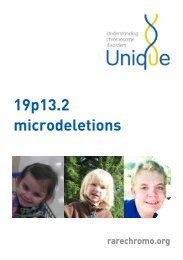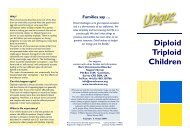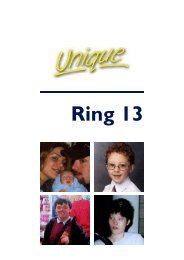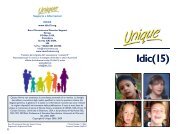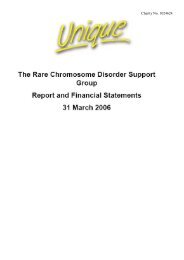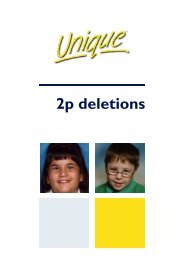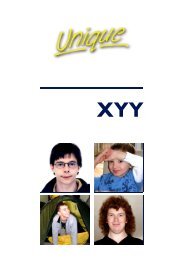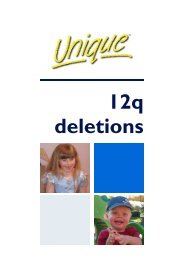15q13.3 microdeletion syndrome - Unique - The Rare Chromosome ...
15q13.3 microdeletion syndrome - Unique - The Rare Chromosome ...
15q13.3 microdeletion syndrome - Unique - The Rare Chromosome ...
Create successful ePaper yourself
Turn your PDF publications into a flip-book with our unique Google optimized e-Paper software.
has trouble self-regulating and is very easily distracted. When he is focused he can count,<br />
spell his name etc. When he is not focused he counts ‘1, 2, 3, 17, 17, 20’” – 5½ years<br />
“He has dyslexia and dysgraphia [writing difficulties]. He likes science. He has difficulty<br />
with concentration. When he is doing his homework he can concentrate for about 45<br />
seconds at a time. He needs constant redirection to stay on task. He can read but does<br />
not read for enjoyment” – 10 years<br />
“He is good at mathematics. He is unable to attend discussions for longer than 25-30<br />
minutes and cannot comprehend reading passages unless they are broken down into<br />
smaller parts. He reads comic books, books on superheroes, and monthly magazines for<br />
children” – 15 years<br />
“He has a moderate learning disability. He attended mainstream school and had extra<br />
help in English and maths. He also has extra help in college. He reads Harry Potter<br />
books, Sarah Jayne Adventures and Dr Who books” – 20 years<br />
“He was in mainstream school but had extra help in English and maths. He likes to read<br />
military books” – 22 years<br />
“He has a severe learning disability and was in special education for all of his education.<br />
He doesn’t read but enjoys looking at books” – 24 years<br />
Speech and communication delay<br />
Speech and language delay is common in children with a <strong>15q13.3</strong> <strong>microdeletion</strong><br />
Speech and language development was delayed in many, but not all, children but it is not<br />
known whether the delay was in line with the child’s cognitive abilities. However, two<br />
children had no speech. Expressive language appears to be more delayed than receptive<br />
language: children are able to understand more than they are able to express. Many<br />
children have articulation difficulties. Speech therapy has proved extremely beneficial to<br />
many children. One woman who had speech delay and poor expressive language as a<br />
child spoke well as an adult. Two teenagers and one 11-year-old have nasal speech<br />
(Sharp 2008; Miller 2008; Ben-Shachar 2009; Pagnamenta 2009; van Bon 2009; Masurel-<br />
Paulet 2010; <strong>Unique</strong>).<br />
“He is great at communicating. He knows around 50 words. He does some signing for<br />
‘eat’, ‘down’, ‘biscuit’ and ‘dirty nappy’. He does a lot of pointing” – 20 months<br />
“He is very verbal, but has significant articulation issues. He uses words to<br />
communicate, but will add signs, gestures, point and context clues to help make his<br />
thoughts clearer. He leaves out things like ‘is’ (‘<strong>The</strong> boy eating ice cream. Why Daddy<br />
doing that?’). He mixes and substitutes sounds all of the time. He has a lot of trouble with<br />
more difficult sounds such as ‘L’ and ‘S’ – 5½ years<br />
“<strong>The</strong> sound of his voice is higher than a typical child. It is also more staccato” – 7 years<br />
“No communication issues” – 10 years<br />
“He is verbal and speaks fluently although he can be difficult to understand at times” –<br />
15 years<br />
“He has no communication problems” – 22 years<br />
8



